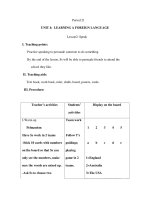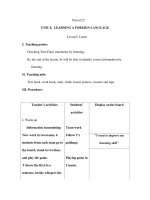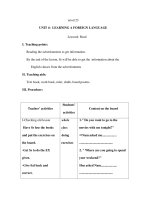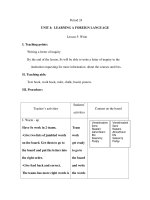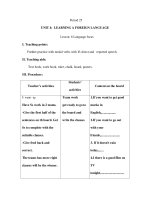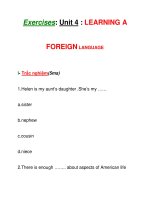Unit 4 Learning a foreign language week 13
Bạn đang xem bản rút gọn của tài liệu. Xem và tải ngay bản đầy đủ của tài liệu tại đây (136.74 KB, 4 trang )
<span class='text_page_counter'>(1)</span>Period: 23 UNIT 4: LEARNING A FOREIGN LANGUAGE LANGUAGE FOCUS I. Objectives: 1. Knowledge, Skills, Attitude: - To help Ss understand the way to change directed speech into reported speech. + Vocabulary: Related to learning a foreign language. + Grammar: Modal verbs with if, reported speech, reported questions. - Speaking, writing, less reading and listening. - Ss will be educated about learning English. 2. Capacity can be formed and developed for students - Self-learning capability. - Cooperation capacity - Communicative competence II. Preparation 1. Teacher: lesson plane, book, color chalks 2. Students: books, notebooks, pen, ruler … III. Students’ activities 1. Warm up 2. Knowledge formation activities (43’) Teacher’s and students’ activities Content - T explains the requirement and the 1. Complete the sentences. Use the modal verbs in structure. brackets and the information in the box. - Ss read examples a and b. * Ss know the way to use coditional sentences. - Ss take notes. If clause (simple present), main clause (modal verb + V) Ex: a. If you want to get good marks, you must study hard. b. You have to go to the university if you want to - Ss do exercises in pairs. study machine. - Some pairs roleplay the dialogues before Answer keys: the class. c. … , you should do a lot of exercises. - T checks and corrects if necessary. d. …, he might miss the train. - Ss copy down the correct answers. e. … , you ought to stay in bed. f. You must do your homework … . - T explains the requirement. 2. Complete the table. - T has Ss complete the table in pairs. * Ss remember the words use in the directed speech - Ss give the answers before the class. and reported speech. - T checks and corrects if necessary. - Ss copy down the correct answers. Answer keys Directed speech present simple tense. Reported speech past simple tense. present progressive tense past progressive tense future simple tense future in the past can/may could/might must had to. Directed speech this these. Reported speech that those. here. there. now today tomorrow. then that day the following day.
<span class='text_page_counter'>(2)</span> - T helps Ss understand the situation.. - T explains the example. - Ss pay attention to teacher and take notes. - Ss do the exercises individually. - Ss compare the answer in pairs. - Ss gives the answer before the class. - T checks and corrects if necessary. - Ss copy down the correct answers. - T helps Ss understand the situation.. - T explains the example. - Ss pay attention to teacher and take notes. - Ss do the exercises individually. - Ss compare the answer in pairs. - Ss gives the answer before the class. - T checks and corrects if necessary. - Ss copy down the correct answers.. 3. Lan’s father held a party to celebrate his mother’s birthday. Unfortunately, Mrs. Thu, her grandmother, has a hearing problem and she couldn’t hear what people were saying. After the party, Lan reported everything to her grandmother. * Ss know how to use the reported speech. Ex : “I’m happy to see you.” Aunt Xuan said she was happy to see you. Answer keys a. Uncle Hung said that birthday cake was delicious. b. Miss Nga said she loved those roses. c. Cousin Mai said she was having a good time there. d. Mr. Chi said he would go to Hue the following day. e. Mrs. Hoa said she might have a new job. f. Mr. Quang said he had to leave then. 4. This morning Nga had an interview for a summer job. When she arrived home, she told her mother about the interview. * Ss know how to use the reported speech. Ex: “Do you like pop music?” She asked me if/whether I liked pop music. “Where do you live?” She asked me where I lived. Answer keys a. She asked me how old I was. b. She asked me if/whether my school was near there. c. She asked me what the name of my school was. d. She asked me if/whether I went to school by bike. e. She asked me which grade I was in. f. She asked me if/whether I could use a computer. g. She asked me why I wanted that job. h. She asked me when my school vacation started.. 3. Consolidation (2’) T emphasizes the way to change yes/no-questions and wh-questions into reported speech. IV. Experience: ……………………………………………………………………………………………………………………………………………………………………… ……………………………………………………………………………………………………………………………………………………………………… ………………………………………………………………………………………………………………………………………………………………………. Period: 26 THE SECOND ENGLISH TEST OF GRADE 9 DURATION: 45 MINUTES I. Objectives. 1. Knowledge, Skills, Attitude:. - Exam students’ knowledge from unit 3 to unit 4.. + Vocabulary: Related to “A trip to the countryside” and “learning a foreign language”.. + Grammar: The past simple with wish, prepositions of time, adverb clause of result, modal verbs with if, and reported speech. - Listening, speaking, reading and writing - Ss should be careful..
<span class='text_page_counter'>(3)</span> 2. Capacity can be formed and developed for students - Self-learning capability. II. Preparation 1. Teacher: lesson plane, book, color chalks, cassette and tape 2. Students: books, notebooks, pen, ruler … III. Students’ activities 1. Matrix: Nhận biết Topic. TNKQ 6. 1. Language focus. TL. Thông hiểu TNKQ. TL. 4 1,5. 1,0. 2,5 4. 0,5. 6 2,0. 2,5 2. 3. Writing. 1,0 5. 4. Listening. 2,5 6. 6 1,5. Totel 10. 2. 2. Reading. Totel. Vận dụng Cấp độ thấp Cấp độ cao TNKQ TL TNKQ TL. 9 1,5. 2,5 2,5. 2 4,5. 3 5 1,5 5. 1,0. 3 26 1,5 10.0. 2. The content of the test A. Language focus. I. Circle the best option to complete the blanks. (4.0 marks) 1. Lan returned home ………. 8 o’clock last night. a. in b. on c. at d. between 2. We usually go to our home village ……… the summer. a. to b. on c. in d. at 3. They will be in Ha Noi ……… Sunday. a. to b. on c. in d. at 4. In oral examination, the candidates must answer examiner’s questions by ……… . a. writing b. reading c. listening d. speaking 5. Another word for “maize” is “………”. a. corn b. food c. cake d. cook 6. If you study hard, you can ……… the exam. a. will pass b. passing c. passes d. pass 7. Mai wishes she ……… a new shirt. a. has b. have c. could have d. can have 8. Nam is sick today, ……… he won’t go to school. a. but b. because c. if d. so B. Reading (2.0 marks) Read the passage carefully. England is not a large country. No town in England is very far from the sea, and many English families spend their summer holidays at the seaside. There are no high mountains in England, no very long rivers and no very large forests. There are many towns in England. No town is very far from another. The English countryside between the towns is like a carpet of many colors. In spring and summer, the fields, meadows and forests are light green or dark green, and the gardens are green, red, blue, yellow and white with flowers. * Answer T (true) or F (false) for the following statements (1.0m) …… 1. No town in England is very far from the sea. …… 2. There are very long rivers in England. * Answer the following questions (1.0m) 1. Is England a large country? -> ……………………………………………………………………………………………………………….. 2. Where do many English families spend their summer holidays? -> ……………………………………………………...
<span class='text_page_counter'>(4)</span> C. Writing (2,0marks) Write reported speech for the following situations. 1. Mr. Lam said: “I love these roses”. -> Mr. Lam said ………………………………………………………………………………. 2. Hung said: “I am doing my homework now”. -> Hung said ……………………………………………………………........... 3. Teacher asked me: “What is your name?” -> Teacher asked me ……………………………………………………………. 4. I asked Long: “How can I help you?” -> I asked Long ……………………………………………………………………………. D. Listening (2,0 marks) Listen and fill in each blank with one suitable word. Every year students in many countries learn (1)…… Some of these students are young children. (2) …… are teenagers and adults. Some learn at school and others study by (3) ……. A few learn English just by hearing the language in film, on television, in the office, or among their friends. But not many are lucky enough to do that. Most people must work hard to learn another language. Why do people want to learn English? It is not difficult to answer that question. Many boys and girls learn English at school as a compulsory subject. Adults learn English becauseit is useful for their work. Teenagers learn English for their higher studies. Other people (4) ……… English because they want to read newspapers or magazines in English. - The end3. Answer key: A. Language focus Circle the best option to complete the blanks. (2,5 marks) 1.c 2.c 3.b 4.d 5.a 6.d 7.c 8.d B. Reading (2,5 marks) * Answer T (true) or F (false) for the following statements. 1. T 2. F * Answer the following questions. 1. No, it isn’t. 2. Many English families spend their summer holidays at the seaside. C. Writing (2,5 marks) Write reported speech for the following situations. 1. Mr. Lam said he loved those roses. 2. Hung said he was doing his homework then. 3. Teacher asked me what my name was. 4. I asked Long how I could help him. D. Listening (2,5 marks) Listen and fill in each blank with one suitable word. 1. English 2. others 3. themselves 4. learn 4. Consolidation IV. Experience: ……………………………………………………………………………………………………………………………………………………………………… ……………………………………………………………………………………………………………………………………………………………………… ………………………………………………………………………………………………………………………………………………………………………. Signature of the Leader Week 13: ............................................................................. Nguyễn Bích Ngân.
<span class='text_page_counter'>(5)</span>



